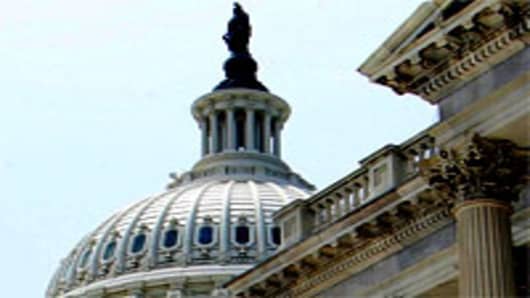The 112th Congress convenes this week with a surge of new Republican energy—and big questions about where that energy will go.
Will that energy pour into renewed partisan warfare, with President Obama battling a Republican-led House infused with Tea Party fervor? That's what most of America's recent political history would suggest.
Or will it go into a bold, bipartisan push for action on reducing America's long-term budget deficit, and perhaps overhauling the tax system at the same time?
The surprisingly productive lame-duck Congress late last year, when Obama struck a tax-cut deal with Republican leaders, suggests that might be possible, too.
The likeliest result is a mix of both.
For a while, it may be hard to tell the difference between the two anyway. That's because some early gestures by the new House under Speaker John Boehner will be at least partly symbolic.
One example is a new set of procedures in the chamber designed to demonstrate the basis in the Constitution for House action; those procedures represent a response to Tea Party pressure to keep government spending and regulation without proper boundaries, but are unlikely to alter policy very much substantively.
In a similar vein, the promised House vote on repealing Obama's cherished new health-care lawis highly unlikely to put repeal legislation on Obama's desk. The Senate remains controlled by Democrats, and the president could block such legislation with his veto pen anyway. The most important challenge to administration health policy remains in the courts.
One strong clue will come it the fight over raising the federal debt ceiling, expected as early as March. That fight will expose both strains of Tea Party tension—between Obama and Republicans over the country's basic direction, and between Republican leaders and Tea Party activists over how fast and aggressively to move.
The administration's top economist, Austan Goolsbee, has warned it would be "insanity" if Congress were to balk at raising the debt limit, creating the possibility of a government default, in an attempt to force the administration to accept Republican-backed spending cuts. Boehner, for his part, has warned fellow Republicans they need to handle the issue "like adults."
The most significant initial event in setting the tone for Washington's new governing dynamic will be the president's State of the Union address, which is expected later this month.
Obama is expected to draw lines of resistance against some Republicans demands, such as canceling unspent stimulus funds, rolling back government spending to 2008 levels and cutting back new financial regulations.
But administration aides said the White House does intend to demonstrate its commitment to reducing spending. The question is whether Obama pursues relatively modest spending reductions as a way of building credibility with the American public for more ambitious measures after his 2012 re-election year, or moves more rapidly toward a comprehensive deficit reduction deal.
Such a deal, foreshadowed by the presidential debt-reduction panel's report in December, would reduce entitlement costs for Medicare and Social Security, cut domestic and defense spending alike and raise tax revenue. By reducing loopholes and deductions popular among average Americans and businesses, the tax measures might raise additional revenue while lowering the top marginal rates for both individuals and corporations.
Given the Republicans' drive to make Obama a one-term president, a massive compromise on all those issues will be highly difficult to achieve. So would a deal on comprehensive immigration reform strengthening border security while provide a path to citizenship for illegal immigrants already here.
But eras of divided government have produced some of the signal legislative achievements of the past generation, from tax reform under President Ronald Reagan in 1986 to welfare reform under President Bill Clinton 10 years after that.
Senate Majority Leader Harry Reid, in an interview last month, pointed toward immigration legislation as a potential area for compromise. And few anticipated the scope of the president's lame-duck tax-cut deal with Republicans last month.



